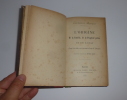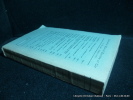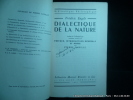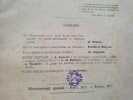13 books for « engels frederic »Edit
-
Century
19th (2)
20th (5)
-
Topics
Communism (1)
Economics (1)
Engels friedrich (1)
Law (1)
Philosophy (4)
Plato (1)
Policy (2)
Political sciences (1)
Socialism (2)
Theatre (1)
-
Countries
Belgium (3)
Denmark (1)
France (9)
-
Syndicate
ILAB (9)
SLAM (8)
Socialisme utopique et socialisme scientifique. Traduction francaise par Paul Lafargue. - [THE INTRODUCTION TO SCIENTIFIC SOCIALISM]
Paris, 1880. 8vo. Original printed green wrappers. Spine worn and to small nicks to back wrapper. A (vague) fold down the middle. Overall in excellent condition. 35 pp.
The rare first edition thus, being the scarce separate printing from Revue Socialiste, in excellent original condition, of Engel's highly popular Utopian Socialism and Scientific Socialism. With this influential pamphlet, Engels set out to make the definitive introduction to scientific socialism. Basing it on the three chapters from his book ""Herr Dühring's Revolution in Science"", he here wished to reproduce the most topical excerpt from the theoretical section of the book, that of strictly scientific socialism. Engels put them together himself and asked Paul Lafargue, Karls Marx' son-in-law, to translate the work into French and add some extra remarks. ""I put them together for my friend Paul Lafargue for translation into French and added a few extra remarks. The French translation revised by me appeared first in the Revue socialiste and then independently under the title: Socialisme utopique et socialisme scientifique, Paris, 1880."" (Engels, from the preface to the German translation, 1882). The French translation proved to be extremely popular and gained a widespread audience. So much so that Engels considered it important to translate it into other languages as well, turning it into a veritable propaganda pamphlet. ""The surprising success of the Lafargue translation in the Frenchspeaking countries and especially in France itself forced me to consider the question whether a separate German edition of these three chapters would not likewise be of value. Then the editors of the Zurich Sozialdemokrat informed me that a demand was generally being raised within the German Social-Democratic Party for the publication of new propaganda pamphlets, and they asked me whether I would not apply those three chapters to this purpose. I was naturally in agreement with that and put my work at their disposal. It was, however, not originally written for immediate popular propaganda. How could what was in the first place a purely scientific work be suitable for that, What changes in form and content were required?"" (Engels, from the preface to the German translation, 1882). From the original manuscript of the work, we know that Marx too was involved in the coming-to-be of this original pamphlet. The last page of the manuscript contains a postscript in Marx's handwriting: ""Dear Lafargue, here is the fruit of my consultation (of yesterday evening) with Engels. Polish the phrases, leaving the gist intact."" The three-page introduction to the work, which is written by Lafargue and signed P.L. at the end, is important in itself, as it gives an introduction to the history of Marx and Engels as the founders of socialism, culminating with the present pamphlet that epitomizes scientific socialism. Paul Lafargue (1841-1911), Karl Marx's son-in-law, was a leading member of the French socialist movement and played an important rôle in the development of the Spanish socialist movement. A close friend of Friedrich Engels in his later years, he wrote and spoke from a fairly orthodox Marxist perspective on a wide-range of topics including women's rights, anthropology, ethnology, reformism, Millerandism, and economics. The work became extremely popular and was translated into numerous languages, exercising profound influence upon the theory of socialism throughout Europe. ""At the request of my friend, Paul Lafargue, now representative of Lille in the French Chamber of Deputies, I arranged three chapters of this book as a pamphlet, which he translated and published in 1880, under the title: ""Socialisme utopique et Socialisme scientifique"". From this French text, a Polish and a Spanish edition were prepared. In 1883, our German friends brought out the pamphlet in the original language. Italian, Russian, Danish, Dutch, and Roumanian translations, based upon the German text, have since been published. Thus, the present English edition, this little book circulates in 10 languages. I am not aware that any other Socialist work, not even our Communist Manifesto of 1848, or Marx's Capital, has been so often translated. In Germany, it has had four editions of about 20,000 copies in all. (Englas in the preface to the English translation from 1892).
Socialisme utopique et socialisme scientifique. Collection : Pages socialistes, X.
Paris, Librairie de l'Humanité, 1924. 12 x 18, 96 pp., broché, bon état (couverture défraîchie).
Principes du communisle.
Bureau d'éditions de diffusion et de publicité. non daté. In-8. Broché. Etat d'usage, Couv. légèrement passée, Agrafes rouillées, Papier jauni. 32 pages agrafées - couverture jauni.. . . . Classification Dewey : 320-Science politique
Traduction et préface de Marcel Ollivier. Classification Dewey : 320-Science politique
Socialisme utopique et socialisme scientifique
BE. 1933. In-8. Cartonné. Bon état, Couv. défraîchie, Dos satisfaisant, Papier jauni. 58 pages. Les élements du communisme.. . . . Classification Dewey : 320-Science politique
Classification Dewey : 320-Science politique
M.E. Dühring bouleverse la science (Anti-Dühring). TOM I : Philosophie.
COSTES Alfred. 1949. In-12. Broché. Bon état, Couv. convenable, Dos satisfaisant, Non coupé. 226 pages.. . . . Classification Dewey : 830-Littératures des langues germaniques
Traduit de l'allemand par Bracke (A.M. Desrousseaux). Classification Dewey : 830-Littératures des langues germaniques
M. E. DUHRING BOULEVERSE LA SCIENCE / EN 2 VOLUMES : TOME 2 : ECONOMIQE POLITIQUE - TOME 3 : SOCIALISME
ALFRED COSTES. 1932. In-12. Broché. Etat d'usage, Couv. légèrement passée, Coiffe en pied abîmée, Intérieur acceptable. 195 + 240 pages. . . . Classification Dewey : 830-Littératures des langues germaniques
TRADUIT DE L ALLEMAND PAR BRACK A. M DESROUSSEAUX Classification Dewey : 830-Littératures des langues germaniques
M. E. Duhring boulverse la science (Anti-Duhring). Traduit par Bracke (A. -M. Desrousseaux). Tome II : ECONOMIE POLITIQUE.
P., Costes, 1932, in 12 relié demi-basane noire à coins, amateur, dos lisse, étiquette rouge, plat supérieur de couverture conservée, 197 pages ; papier terni ; frottis.
...................... Photos sur demande ..........................


Phone number : 04 77 32 63 69
L'origine de la famille, de la propriété privée et de l'État (pour faire suite aux travaux de Lewis Morgan), traduction française par Henri Ravé. Paris
1 volume in-12° relié , demi-chagrin rouge, dos à nerfs décoré, titre doré, coins un peu émoussés, rousseurs surtout en gardes, coiffe supérieure légèrement frottée , XXXIII + 290 p.
Phone number : 06.31.29.75.65
Dialectique de la nature. Introduction de Pierre Naville.
Paris, Librairie Marcel Rivière, Bibliothèque philosophique, 1950, in-8°., Broché, 454 pages. Bon état. Dos insolé. Edition originale de la traduction.
NB Le délai d'acheminement vers la France est de 48h.
M.E. Duhring bouleverse la science (anti-Duhring). Traduit par Bracke (A.-M. Desrousseaux).
Alfred Costes, éditeur, 1949-1955. 3 volumes, in-12, brochés.
[15756]
L'origine de la famille de la propriete privee et de l'etat - collection des Oeuvres Complètes de Friedrich Engels
ALFRED COSTES. 1946. In-12. Broché. Etat d'usage, Couv. convenable, Dos satisfaisant, Quelques rousseurs. 237 pages- Pages non coupées - rousseurs sur la couverture. . . . Classification Dewey : 346-Droit privé, civil
Classification Dewey : 346-Droit privé, civil
Le devenir social - Revue internationale d'économie , d'histoire et de philosophie - N.3 ( 3e année ) - Mars 1897
Paris Giard 1897 In4 - broché - non coupé - environ 90 pages - dos fendu avec manque de papier
Moyen
La pensée, revue du rationalisme moderne (arts, sciences, philosophie), nouvelle série, N° 25, juillet-août 1949.
Paris, La Pensée, 1949. 19 x 28, 160 pp., broché, bon état.
 Write to the booksellers
Write to the booksellers![Socialisme utopique et socialisme scientifique. Traduction francaise par Paul Lafargue. - [THE INTRODUCTION TO SCIENTIFIC SOCIALISM]. "ENGELS, ...](https://static.livre-rare-book.com/pictures/LLX/60262_1_thumb.jpg)
![Socialisme utopique et socialisme scientifique. Traduction francaise par Paul Lafargue. - [THE INTRODUCTION TO SCIENTIFIC SOCIALISM]. "ENGELS, ...](https://static.livre-rare-book.com/pictures/LLX/60262_2_thumb.jpg)
![Socialisme utopique et socialisme scientifique. Traduction francaise par Paul Lafargue. - [THE INTRODUCTION TO SCIENTIFIC SOCIALISM]. "ENGELS, ...](https://static.livre-rare-book.com/pictures/LLX/60262_3_thumb.jpg)











